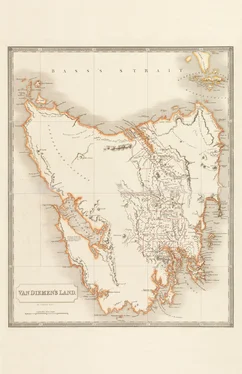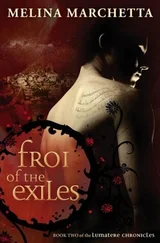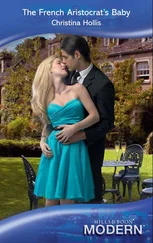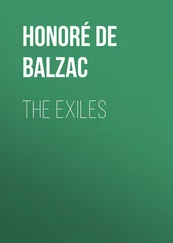Her mouth watered at the thought of steaming oysters plucked from the coals.
By the time she made her way back to the settlement, the rain had stopped. Some of the Palawa and a few missionaries were milling about, but there was no sign of the Franklins. Mathinna’s heart surged with hope. She slipped into the schoolroom, where a few children were learning their lessons. The schoolteacher looked up from his primer. He appeared to take no notice of her wet dress, the soiled wallaby skin, the frightened look in her eyes. He seemed unsurprised that she’d returned.
“Mary,” he said, rising. “Come with me. They’ve been looking for you.”
The Tasman Sea, 1840
When the captain lifted her into the sloop, Mathinna looked back and saw her stepfather standing on the ridge, silhouetted against the sky, shading his eyes with his hand.
“Palle!” she cried, waving.
He raised his arm, his fingers outstretched.
“Palle . . .” His figure blurred through her tears.
“That’s enough, now,” the captain said.
She sobbed quietly as he pulled anchor and readied the sail. Deep in her bones, she felt certain that she would never see her stepfather again. She watched his figure recede into the distance as the boat left its mooring and headed into the open ocean.
Spitting on the deck, the captain said, “I was told to treat ye like a little lady. I’ll do what they say, but ye don’t look like any lady I ever saw.”
Mathinna didn’t answer. She wiped her eyes with her hands.
She’d never been out on the water before. Only the seafarers among the Palawa went out in canoes. She had not known to expect the gliding rises and sudden drops, the salty fizz in her nose, the hard brightness of the sun, the stomach-churning smell of fish innards rotting in a bucket.
Her mouth filled with saliva. Her eyes watered. Before they even lost sight of Flinders, she was vomiting into a pail.
“It’s in your head.” The captain tapped his temple. “Calm yourself.”
When Mathinna had returned to the settlement, three days earlier, she was told that the Franklins were on their way back to Van Diemen’s Land. They’d left behind The Cormorant and its captain from their small fleet for the express purpose of ferrying her to Hobart Town. George Robinson’s wife, Maria, had helped her pack her meager belongings into an old steamer trunk for the trip: two plain, English-style cotton dresses, two sets of pantaloons, a bonnet, a pair of leather shoes. Mathinna made a nest of the wallaby-skin cape for Waluka in a rush basket Palle had woven for her, tucking three shell necklaces her mother had made beneath it.
“Bringing a rodent to the governor’s residence hardly seems advisable,” Robinson said when he saw Waluka.
“It’s a marsupial, George.” His wife pantomimed paws like a kangaroo. “It has a pouch. She raised it from birth; it’s quite tame.”
“It looks like a rat.”
Maria put her hand on his arm. “This child is leaving behind everything she has ever known. What harm is there in letting her keep it?”
Now, crouching down, Mathinna opened the basket. She pulled out one of the shell necklaces and draped it around her neck, then lifted Waluka onto her lap. With his milky skin, pink nose, and long talons he did look a bit like a rat, she supposed. In her lap he was limp, motionless, but she could feel his tiny heart skittering as she stroked his chest with the back of a finger.
“I’m surprised they let ye bring that mangy thing,” the captain said.
She ran a protective hand down Waluka’s back. “Mr. Robinson said I could.”
“Ever eaten possum?”
She shook her head.
“Not bad,” the captain said. “Tastes like eucalyptus.”
She couldn’t tell if he was joking.
The sky was as gray as the flat stones in the cove. Waves glinted like shale. Spreading out his tattered map, the captain beckoned Mathinna over. He traced the coastline of a large landmass with his forefinger until he reached a narrow passage near the bottom. Tapping it, he said, “This is where we’re headed. Ten days’ journey.”
It looked like nothing to her: jagged lines on a piece of paper. But as she examined the map, sounding out the names of towns and regions, she moved her own finger up the coastline, the reverse of their journey. Past Port Arthur, around tiny Maria Island, through Four Mile Creek and around Cape Barren Island, and finally back to Flinders, a speck in the ocean above the bulk of Van Diemen’s Land.
Running a finger along the shells of her necklace, Mathinna remembered her mother placing it in her hands. “Every person you’ve ever cared about, and every place you’ve ever loved, is one of these shells. You’re the thread that ties them together,” she’d said, touching Mathinna’s cheek. “You carry the people and places you cherish with you. Remember that and you will never be lonely, child.”
Mathinna wanted to believe it. She wasn’t sure it was true.
The captain slept in fits and starts; at the slightest dip or flap of the sail he’d startle awake. She pretended not to notice when he moved behind a barrel to use the chamber pot or wash his armpits in a bucket. He was probably only in his midthirties, but to Mathinna he seemed ancient. He was coarse, but not unkind. His only task, he told her, was to deliver her safely to the governor, and by hook or by crook he would do that. Mainly he left her alone. When he wasn’t tending the mainsail or charting their course, he sat on one side of the boat, whittling naked women out of wood with a small curved knife, and she sat on the other, fingering the tiny green shells around her neck and playing with Waluka.
Each morning the captain performed a checklist of tasks: recording barometer readings in a notebook, checking the sail for rips and tears, nailing down loose boards, splicing rope. He trailed a lure behind the boat and pulled in red-striped perch and jack mackerel and the occasional salmon. He’d stun the flopping fish before gutting it quickly with his carving knife, then make a fire in the cook box, a metal contraption with three sides on four sturdy legs, with a tray in the bottom for the fire and a grate on top.
Mathinna had never eaten scale fish; the Palawa ate only shellfish. They laughed at the missionaries when they saw them picking tiny bones out of their teeth. But now her mouth watered at the smell of crackling skin and the sight of white flesh melting from the bone. “Try it,” the captain said one evening, catching her eye. He sliced off some chunks, dumped them on a pewter plate, and handed it to her. When she tried to pick up the chunks with her fingers, the fish separated into flat fleshy disks. She slipped them into her mouth one by one, marveling at the buttery flavor. He grinned. “Better’n hardtack, ain’t it?”
The captain told her stories about his life—how he’d stolen rare coins to pay for medicine for his sick mother (or so he said), ending up on a convict ship to Van Diemen’s Land, where he did six years of hard labor at Port Arthur. When he mentioned he’d been a sealer, Mathinna’s heart thumped. But she hadn’t seen any sign of savagery.
“Do you like . . . killing seals?” she asked.
He shrugged. “It’s rough work. Dirty and cold. But I didn’t have much choice, din’ I? At least I knew I’d be paid for me labor. Anyway, I seen worse in prison. What people do to each other, ye wouldn’t believe.”
Why wouldn’t she believe? Here she was, torn from her family and everyone she knew at the whim of a lady in satin slippers who boiled the skulls of her relatives and displayed them as curiosities. (What people do to each other, indeed.)
“That’s all in the past,” the captain said. “I’m on the straight and narrow now. When the governor pays your wages, ye jump when he tells ye. And as high.”
Читать дальше












